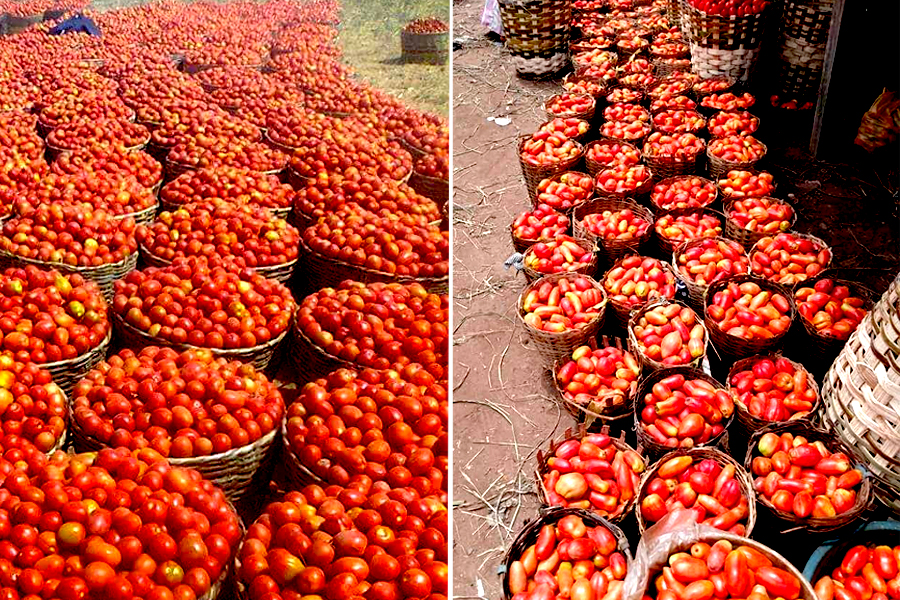
Tomato Waste In Benue State; The Way Forward
With no disrespect to anybody, I have seen so many people make very ignorant posts about tomato waste in Benue state and ask why this cannot be processed into tomatoes puree. The truth is, Benue tomatoes have one of the lowest qualities and cannot be used for processing into tomatoes paste for several reasons.
Tomato varieties used for processing are special tomatoes with special characteristics and they are generally called “processing varieties”.
For a tomato variety to be suitable for processing, it must have;
- Uniform maturity/ripening (because they’re harvested at once, mostly mechanically)
- Good colour
- High brix (sugar content) of about 4.7 to 5.5
- Low peel and seed content
- High puree volume
- Moderate acidity of about pH 4.3
Can you now see that the tomatoes we produce does not in anyway meet these qualities?
In addition to the above, tomatoes meant for processing must have very good post harvest qualities. In tomato production, It is very difficult to achieve good post-harvest qualities if your pre-harvest activities like fertilizer application are not properly done. Fertilizers play an essential role in the post-harvest quality of tomatoes.
Fertilizers that contain Calcium, Magnesium etc which are very essential in achieving these qualities are not readily available in Benue State.
From my interaction with tomato farming groups, about 95% of Benue tomato farmers have never heard about fertilizers like Calcium Nitrate, Magnesium Nitrate/Sulphate let alone seen it.
How then do they achieve these post-harvest qualities?
It is no news that tomatoes produced in Benue State has very inferior quality. It is usually watery with a lot of black spots (blossom end rot) and unattractive. This is why tomatoes brought from Jos are priced above Benue tomatoes.

Now let us talk generally about tomato waste in Benue state and the way forward.
Let’s not start with blaming the government. A typical Benue tomato farmer is not business-minded. If you are business-minded, you can’t be doing the same thing year in year out without results and still continue. The least you can do is to stop.
Below are some of the factors responsible for the tomato waste in Benue state.
- Use of farm saved seeds (seeds gotten from harvested fruits)
Majority of the tomato farmers in Benue State use farm-saved seeds. These seeds over the years lost its qualities and they can never give you the desired result. For grains, you may be lucky but when it comes to vegetables, it is very difficult. This is partly why tomatoes from Benue state have fruits that are not uniform in size, colour etc.
- Use of improper fertilisers
Majority of Benue tomato farmers use NPK 15:15:15 or NPK 20:10:10 for fertilization of their tomatoes. This is a practice that has been on before I was born. No research, no innovation. When you approach farming from a business view point, you don’t behave like this. Unfortunately it seems everyone is doing the same thing.
Our farmers need to invest in fertilizers that will give them higher yields and better fruit quality. Until Benue farmers start using better and a wider range of fertilizers like Calcium Nitrate, Magnesium Sulphate, Mono-ammonium Phosphate, Mono-Potassium Phosphate etc, we may never get out of this era of low yields and poor post-harvest quality.
- Wrong growing season
The biggest enemy of most fruit vegetables like tomato is water. What I mean is that it is more difficult to grow tomatoes in the rainy season than the dry season. Tomato plants don’t like water touching their bodies, they prefer when water is supplied at the root zone. Water on tomato plants encourage fungi infestation which can be difficult to manage.
Our farmers need to invest more in dry season tomato production to take advantage of the high prices and scarcity within these periods. We are blessed with many rivers. The far northern farmers already understand this trick. They grow cereals in the raining season and grow vegetables in the dry season.
4. Poor pest management.
Benue tomato farmers are not familiar with the use of nematicides, fungicides, bactericides, insecticides etc. Most farmers feel it is not necessary to use this. At most they use insecticides. It is impossible to successfully plant tomatoes in the rainy season without the use of fungicides.
5. Poor market access
The Mile 12 Market in Lagos is the biggest vegetable market in West Africa and holds a lot of potential for our farmers. When you go to this market, you see a lot of far northerners in this market. The distance from Kano to Lagos is further than that of Benue to Lagos. However, our farmers have refused to access this market. We should not wait for the government to do everything for us.
When you go to the yam section of this market, you find several Benue traders there. It is not the government that sponsored them. They are simply thinking outside the box. The tomato farmer that brings tomato from Tyowanye to Gboko market does this year in year out without results. Why can’t we look outside?
- Poor government involvement/ high tax
The taxes leveled on farmers is simply too much. Unfortunately these farmers don’t benefit from the taxes they pay. Government involvement with tomato farmers is also very low. I am a farmer, let me not talk too much.

What is the way forward?
I am a very practical person, this is way i don’t like focusing too much on the government when I want to achieve a task. What does the farmers need to do for themselves to change the status quo?
- Our farmers need to completely stop using farm-saved seeds and invest in the use of hybrid seeds. Different hybrid seeds have different characteristics. Some are bred for shape, colour, taste, disease resistance, maturity duration, yield etc.
When choosing hybrid seeds for Benue, the characteristics a farmer need to pay attention to is disease resistance (very important), yield, heat tolerance, shape etc
Hybrid seeds come at a price but it saves you a lot more. It is not the same as OPV (open-pollinated varieties). The common OPV seeds in Benue are Roma VF, Rio Grande, UC 82 B. Please note that the mentioned varieties are not hybrids. - Our farmers need to improve on the type, quantity and quality of fertilizers to use if we want to achieve higher yields and fruit quality. Using only NPK 15:15:15 and NPK 20:10:10 is not the solution. This needs to be stopped completely except for those who can’t afford it. I am willing to give a more detailed lecture on this.
- Our farmers need to invest in dry season farming. The wet season is one of the most difficult seasons to grow tomatoes open-field. We also need to structure our farming in such a way as to avoid glut periods. I am willing to work with tomato groups to achieve this and train them.
- Proper pest management is one thing our farmers need to invest in. There are many companies out there selling good fungicides, insecticides etc. Until farmers start using fungicides, nematicides and insecticides, we will not achieve much.
- Our farmers need to unite together and explore other markets outside Benue. It is wrong to say there is no market for tomatoes when in reality we have not explored markets outside the state. Port Harcourt and Lagos have the biggest market potential for “good quality” tomato. However, before we start exploring these markets, we need to grow our plants in such a way that we will be able to transport them with minimal post-harvest losses.
We also need to unite and stop the criminal taxes imposed on farmers. These taxes have chased away so many traders from doing business in Benue. Until this is controlled, we will keep losing market. Benue tax is the highest in the country.
The state government also has a major role to play in market access. If the government set up market points in Lagos and Port Harcourt, they can buy off these produce from our farmers and resell them with good margins. BIPC can look into this aspect. I am willing to discuss with them or anyone on how this can be achieved. - More awareness and training is needed to take Benue out of this tomato mess. The farmers also need support in terms of input.

In order to achieve this, Akaazua-Barnabas Foundation will be starting it’s an agricultural training centre in Makurdi with tomato as its priority crop. Few people will also be empowered with inputs and the tomato association in Benue is going to be carried along.
One man’s effort will never be enough but we need to start from somewhere.
More effort is needed from the government, professionals and individual organisations to achieve this.

Chekwa Sir Ralph
A very good write up, it really ex-rayed the plight of Benue tomato farmers which is not far from what other famers suffer. I went through to the end and really enjoyed the piece…
I however disagree on many issues but the fact that the Benue Farmer is not a very serious business person remains very valid.
We rely so much on the government; but the two points you mentioned which is infrastructure and taxation has to be championed by Government for other things to work.
I was personally a tomato farmer, we got the Jos variety and cultivated it here too, used insecticides, tend it well and the products were available but the activities of middlemen killed the spirit of the farmers.
We have University of Agric, College of Agric, Ministry of Agric but we can’t boast of any improved variety.
So many issues my brother…
We’re glad you ended the piece with your desire to take up tomato farming to the next level here. I’ll personally be following the updates.
Nice piece once again.
Thanks.
AKAAZUA BARNABAS
My brother, most of the varieties grown in Jos will not perform very well in Benue because the majority of the farmers use open-pollinated varieties which are not hybrids. They have good weather that favours them, but how about the Kano farmer?
Between the time I wrote this article and now, I have proven that with suitable varieties and good agronomist practices, we can produce better tomatoes than what comes from Jos.
Forget our institutions, Nigeria as a whole cannot boast of breeding any improved tomato varieties, but other states have been able to solve this problem.
Ifee Nna
Hi, I have read your article and I must say, you have dealt with the matter in all sense. I am interested in starting up a tomato farm. In fact, I am ready to return to Nigeria for this course. But my fear has always been how to start. I would like to have a direct conversation with you.
Barnabas Akaazua
You can send me a mail to akaazuabarnabas@gmail.com